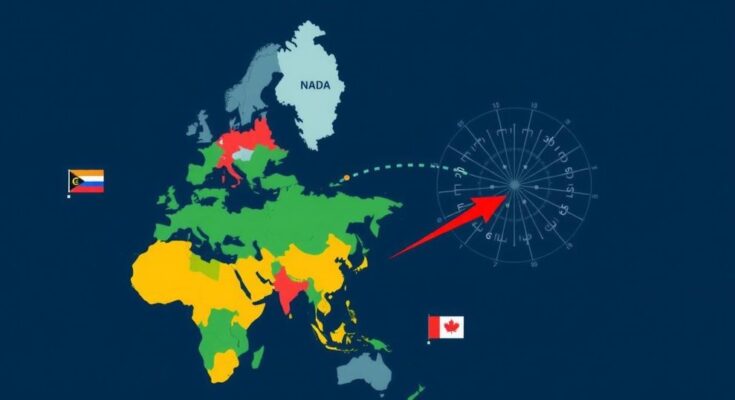At the International Court of Justice in The Hague, vulnerable nations urged accountability from a handful of countries for their significant role in climate change. Representatives, including Vanuatu’s Ralph Regenvanu, emphasized that these nations produce the majority of greenhouse gases while least affected by the crisis. As the ICJ hears statements, the court’s advisory opinion may establish pivotal guidelines for international climate responsibilities and potential reparations.
Representatives from vulnerable nations have urged the International Court of Justice (ICJ) to consider holding certain countries accountable for their significant contributions to the climate crisis. Ralph Regenvanu, Vanuatu’s special envoy for climate change, stated during proceedings at The Hague that just a select few nations are responsible for the vast majority of greenhouse gas emissions, which have disproportionately affected vulnerable regions like Pacific island nations. The hearing exemplifies years of advocacy by Vanuatu and other Pacific island nations, advocating for a clear stance on state responsibilities regarding climate change as dictated by international law.
The ICJ hearing has attracted participation from 98 nations and numerous organizations. It follows a resolution from the UN General Assembly requesting the court’s advisory opinion on what obligations states have concerning climate change mitigation and potential repercussions for failing to comply. Countries with significant historical emissions, including the United Kingdom and Russia, along with nations relatively unencumbered by greenhouse gas production, such as Bangladesh, will present their arguments. Statements will also be made by the United States and China, noted as the world’s leading greenhouse gas emitters, despite their non-recognition of the court’s authority.
Amid increasing climatic threats, Regenvanu highlighted the grim situation facing Pacific island nations, which are experiencing rising sea levels and increased natural disasters, stating, “We find ourselves on the frontlines of a crisis we did not create.” Ilan Kiloe of the Melanesian Spearhead Group echoed these sentiments, warning that many inhabitants of affected nations may not survive the consequences of climate change.
Margaretha Wewerinke-Singh, leading counsel for Vanuatu, asserted the necessity for reparations commensurate with a state’s historical contributions to climate change. She emphasized failures relating to fossil fuel regulation and financial support under existing international frameworks as violations of international law. Likewise, Cynthia Houniuhi, representing Pacific Island Students Fighting Climate Change, described the peril faced by youth amid the climate crisis, expressing a desire for a substantial change from high-emission entities.
The ICJ is one of three international courts tasked with addressing climate change’s legal implications, alongside the International Tribunal for the Law of the Sea (ITLOS) and the Inter-American Court of Human Rights. ITLOS had previously clarified that greenhouse gases are classified as pollutants with enforceable responsibilities for countries involved. The ICJ’s forthcoming opinion will draw from these precedents but remains non-binding, serving to inform future climate litigation and negotiations.
As the session commenced, testimonies from those directly impacted by climate change were acknowledged, providing a personal dimension to the legal discussions. Houniuhi concluded her address with a plea for judges to recognize their role in potentially restoring hope for effective global climate action, stating, “As judges, you possess the power to course-correct and renew hope in humanity’s ability to address the greatest challenge of our time.”
The ongoing climate crisis has sparked significant legal and moral debates regarding the responsibilities of nations, particularly those with substantial historical contributions to greenhouse gas emissions. Pacific island nations, such as Vanuatu, represent some of the most vulnerable regions facing extreme impacts from climate change, including rising sea levels and severe weather events. The International Court of Justice is currently hearing these cases as part of a broader effort to determine how international law can hold countries accountable for their role in this global crisis. This hearing represents a culmination of advocacy efforts aimed at establishing a legal framework for climate change responsibilities among nations.
In conclusion, the hearings at the International Court of Justice signify a critical step toward addressing the accountability of nations in the climate crisis, particularly the few that have historically contributed most to greenhouse gas emissions. Testimonies from vulnerable nations illustrate the dire consequences of climate change, emphasizing the necessity for reparations and adherence to international law. The outcomes of this court’s deliberations may set important precedents for future climate-related litigations and international agreements, fostering a sense of hope and responsibility among the global community.
Original Source: www.theguardian.com




